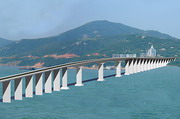New Taiwan affairs chief vows to boost cross-Straits ties
( Xinhua )
Updated: 2013-03-25
|
|||||||||
The Chinese mainland's newly appointed Taiwan affairs chief said on March 22 that the mainland aims to promote the comprehensive development of Cross-Straits ties in a steady manner this year.
Zhang Zhijun made the remarks while addressing the 11th Cross-Straits Relations Symposium held in the city of Pingtan in southeast China's Fujian province.
The symposium marked his first public appearance at a major cross-Straits function after becoming the new head of the Taiwan Work Office of the Communist Party of China (CPC) Central Committee, as well as head of the Taiwan Affairs Office of the State Council.
Policies unchanged
Zhang said the mainland won't change its current polices toward Taiwan, as they have been proven correct in practice over the past five years.
"There is no reason for us not to stick to the right policies," he said, adding that the mainland will adhere to methods that have been proven effective and continue to improve them.
The senior official described the past five years as a period that marked the rapid development of mainland-Taiwan ties.
He said 2012 saw cross-Straits relations withstand key tests and achieve great progress.
"We are pleased about the peaceful development of mainland-Taiwan ties and have full confidence in the future," he said.
Comprehensive development
Zhang said this year, the mainland aims to push for the comprehensive advancement of cross-Straits relations in a steady manner.
This means that new progress should be made in cross-Straits relations, mechanism-building concerning various aspects of cross-Straits relations should be strengthened and that the quality and efficiency of mainland-Taiwan exchanges and cooperation should be improved, Zhang said.
The new chief expressed hope that both sides of the Taiwan Straits can maintain positive interaction based on the consolidation of the common political foundation of opposing "Taiwan independence" and sticking to the "1992 Consensus."
He said he hopes that the mainland and Taiwan can seek common ground while resolving differences and deepen the common understanding that both sides belong to one China.
Zhang also urged both sides to accelerate follow-up negotiations regarding the 2010 Economic Cooperation Framework Agreement and further promote two-way trade and investment.
He said the mainland will work to introduce favorable arrangements for Taiwan compatriots, help Taiwanese benefit from cross-Straits cooperation and make it easier for Taiwan youth to explore careers on the mainland.
Political issues
Zhang said political issues should be faced squarely and should never be artificially categorized as a "restricted area."
People from both sides should think about political issues in an active manner and aim to find solutions for them, he said.
Both sides should gradually accumulate common understanding of political issues by tackling easier ones first and approaching more difficult issues later, he added.
Zhang said the mainland would like cross-Straits academic institutions and experts to conduct dialogues regarding political issues to create conditions for politically centered negotiations between the mainland and Taiwan in the future.
Organized by the Beijing-based Research Center on Cross-Straits Relations, the symposium featured discussions on theories regarding the peaceful development of Cross-Straits relations and ways of promoting Cross-Straits exchanges and cooperation.
Around 120 experts and professionals on Cross-Straits relations from China's mainland, Taiwan, Hong Kong and Macao, as well as foreign countries attended the event.






